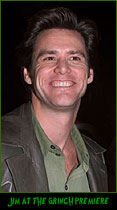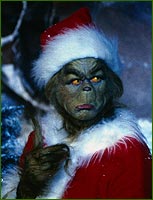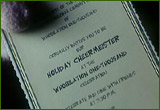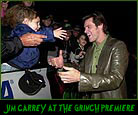IN
THE HALL OF THE MOUNTAIN KING
By Heather Wadowski
It's
the movie that has been anticipated for months now. Ron Howard's live-action
"How the Grinch Stole Christmas." The film, which stars comedic
super star Jim Carrey, hits theaters November 17, but I got the chance
to talk with the star before the film's release.
When Jim Carrey walked in he looked
as wonderful as ever. I could tell he was excited to be a part of such
a classic and timeless story by the smile on his face as he sat down.
After quickly thanking "Andy Kaufman" for letting him break
through on the set of "Man on the Moon" to audition for Ron
Howard, we quickly got down to the important issues of not only the
film, but Jim's life as well.
Since
"How the Grinch Stole Christmas" is such a classic and beloved
story, did you have any reservations or hesitations towards trying to
fix something that wasn't broken?
Jim:
Not at all. First of all with Ron Howard being involved I thought this
would be something really special. It just had never been done in this
medium and I thought it was a cool idea. It's just one of those things
you can't say no to. I mean, if I destroyed it for you in some way I
apologize, I just can't help myself. I'll say no to the remake of "It's
a Wonderful Life" if that helps. Honestly
though, there has been the book and television show and it was like,
where do we go? But now, it's like, ohmigod. There is just no comparison.
It's its own animal. It's so beautiful to look at. The special effects
people did such a wonderful job. When I saw the effects trickle in I
of course was caught up in my character and making sure I'm doing the
right things but I started seeing these images come through. I went
down to Digital Domain and started looking at stuff and I just became
a kid again. I was like, my god! This is "Bedknobs and Broomsticks"
times a thousand. It's just so beautiful and really is its own universe.
There
is a lot of talk about "How the Grinch Stole Christmas" could
be up for an Academy Award for special effects/make-up. Given your past
history with the Academy, do you feel that Robin Williams recent win
for "Good Will Hunting" and the negativity the Academy got
from that by the press had any influence on you getting overlooked for
"Man on the Moon" and "The Truman Show?" And do
you think that there will come a time in recent history where the Academy
will finally acknowledge comedians as actors and not just comedians?
Jim:
That's nice of you to say that. I don't think that it's a conspiracy.
I think the Academy votes on what they see, first of all. They get a
hell of a lot of tapes and generally the ones that are more publicized
are the ones they watch. There's a lot to the voting process for the
Academy Awards, and I don't think that there is a group of people who
get together and try to figure out what they are going to do to me next.
It's not like the Academy is saying, 'Ten years down the road, maybe,
but not now.' I really don't think they are doing that. As for comedians
being recognized, there have been some comedians in the past that have
been. It just depends on taste. Goofy, crazy comedy doesn't usually
get recognized, which I think it should, but the show is four hours
long now, so who knows. I get recognized by the public though-- too
much actually. I'd like to get a loaf of bread without being recognized
once in awhile (laughing).
 Tell
us about the make-up. Was there any part of you left uncovered?
Tell
us about the make-up. Was there any part of you left uncovered?
Jim:
There was no skin to be had. Everything was covered so it was impossible
to scratch my nose. It was a real lesson in zen. Every now and then
it would be funny cause they would know I having a problem because I
would punch myself in the leg as a pain deferment. You know, if you
pinch your arm or pinch your leg it would temporarily take your mind
off of the discomfort. It was tough the first couple of weeks but then
I was able to transcend it. It's amazing what you can get used to. I
mean, people can live on Mars (laughing)
Was
it a concern for people that you wouldn't be recognized in this film?
Jim:
Yeah, it was a concern for some, but you will know its me. It's just
a little bit of latex. If Ron (Howard) yelled action and I was still
thinking about the suit, I am in trouble. That's the one thing I was
able to do-- Even with the contacts you get to see the Grinch's soul.
I can have the whole Raiders front line sitting on top of me and I can
still act.
Are
you concerned at all that little children will be frightened away by
your make-up?
Jim:
No. I have sat with my daughter and have watched things that are truly
terrifying. I really don't think so though. I mean, right from the get
go you see that this person is just disenfranchised. He is lonely and
left out. He's funny and I think kids will like him. I can't imagine
a kid not wanting to see this. I am just blown away by it.
The
trailers for "How the Grinch Stole Christmas" already show
you with a Grinch face all your own. How did the Grinch face come about?
Jim:
It goes back to when I was a kid and how I imitated things. Also when
I went into make-up that was after the fact. I came up with the face
first. That's why it was kind of confusing for people because they wanted
to see that face, and it did become that face only the Grinch was doing
it.


Did
Dr. Seuss' wife have any say as far as how the Grinch was going to be
portrayed?
Jim:
She talked mostly with Ron, so I had her banned from the set (laughing).
I talked to her a few times while we were doing the project, but it
wasn't like any deep discussion. It was more like her walking into the
make-up trial and saying 'WOW!' or me doing a line here and there and
her liking it, so that is all that matters to me. I heard she had a
real good reaction to the film so I'm happy to hear about that.
What
makes Ron Howard and Rick Baker different from other people you have
worked with?
Jim:
They are both children. That is what makes them unique. In this business
it is really hard to find people who can dance with their inner child
without the help of stimulants. It takes a special person to be in contact
with that part of themselves without any outside help. In today's world
it is necessary to be an adult as well, but in this business it is important
to be a kid as well.
When
"How the Grinch Stole Christmas" was in production, Taylor
was only five years old. What was it like working with someone so young?
Jim:
She was wonderful. She did a great job. I love working with kids and
have had nothing but good experiences with them. She is a very sweet
kid and I hope she stays that way. It is tough being a kid in Hollywood.
It is psychologically tough making those transitions, but people can
do it. Ron did it. You just need great parents to help guide you. Right
now though she is a special kid. She is very unaffected. I mean sometimes
you run into kids that are talking about what they are going to do about
the SAG strike and you just don't want to hear that come out of their
mouth.
What
about the dog?
Jim:
There were actually three dogs, each with his own talent. It was cool
because the dogs were actually from the pound., which is a good Hollywood
story if you want to look at it from that angle. 'Dogs Saved From Pound--
Become Movie Stars!' They were great though. That was probably the hardest
thing to do-- getting the dog to do what you want when you do something
when there were fans blowing in their eyes and insanity on the set.
There was so much technically going on that it was tough for an animal
to stick them in the middle of that and expect them to listen to you
when there are people on ladders screaming 'Hey Fido over here!'
There
are some timely, one-liners in "How the Grinch Stole Christmas."
How were you able to make the film timely without the fear that it wouldn't
appear timeless and outdated years from now?
Jim:
There were a few timely references I got in the film but for the most
part we knew we had to stay away from references people would recognize.
It's frustrating as a comic cause all these things would come into my
head and then I would be like 'oh no, that is too worldly.' But the
specialness about Seuss is he created his own world, his own words for
things... he's created everything a new. So we had to do that as well.
What
do you think about the film? Did you like it?
Jim:
I still haven't seen it completely assembled. I want to go and see it.
I have read the story and some special effects pieces, but I have yet
to see it in its entirety. I am going to wait until the premiere because
I like to do that now. I like to be surprised by myself.
Not
only do you appear in the film but you also rap with Busta Rhymes on
the soundtrack. What was that like for you?
Jim:
It was a blast being in the studio rapping with Busta Rhymes. It was
not exactly what I thought it was going to be. Of course I had an idea
of where the rap groove was and you know I am from Toronto. I had a
good groove going but then Busta Rhymes said to let it hang off the
edge. His rhythm was amazing. Plus my daughter was with me and I was
cool in her eyes for the first time. She just connects so much with
the hip hop world and is so into that and it was the first time she
looked at me and went, 'Dad, wow!' I was cool suddenly.
At
the beginning of the film when the Grinch comes down to Whoville and
messes with the citizens, I noticed a bit of Tony Clifton coming through.
Was Tony on the set?
Jim:
I don't think Tony was around, if he was there would be stories. Maybe
you just wanted Tony to be there. There may have been a similar vocal
tone or something but it was probably just the disenfranchised part
of it, that he too felt left out.
 How
would you describe the character of the Grinch in your own words?
How
would you describe the character of the Grinch in your own words?
Jim:
He's the outcast who didn't feel like he was part of the club. Instead
of trying to deal with it and manufacture himself to become part of
the club, he gives up after one attempt as a child. Basically though,
he is just a guy who wants to be part of the show. All he needs is someone
out there with heart. Someone that goes, 'I know you want to change.'
In
some parts of the world people may not know who Dr. Seuss is, not along
the story "How the Grinch Stole Christmas." Do you think that
will effect the film's success overseas at all?
Jim:
This film deals with a universal feeling. I think it is a universal
story that is so important that people don't even need to know who Seuss
is. I think it is a story on its own. People deal with isolation in
Spain. Everyone understands love and friendship, and all those feelings.
Are
there any plans in the works for the DVD version of "How the Grinch
Stole Christmas" to contain a lot of deleted scenes, or even a
behind-the-scenes look at the make-up? And what are your own personal
feelings on the success of DVDs and their added features, including
behind-the-scenes features and bonus footage?
Jim:
I don't know. I am sure there will be interview stuff and the occasional
shot of me in the corner going 'Ow!' I am sure it will be a beautiful
package though. As for how I feel about DVDs, I do feel that there is
such a thing as knowing too much about a movie. I don't like to see
a magician and know how he does the tricks. There are a lot of things
that will be offered to people that they will be fascinated with but
I myself don't like to see that much. I like to see what the director
wanted me to see and get lost in it.
What
does Christmas mean to you?
Jim:
Family.
Did
you ever have any Grinchs in your own life that tried to ruin your
Christmas?
Jim:
You know I had a couple run in with some alcoholic grandparents who
weren't so nice. But I did make comedy out of it. There was one Christmas
in particular where my father had lost his job and my grandparents were
tipping a few. Grandpa had my dad in the corner going, 'You're a loser.
You're out of work, you can't feed your family...' you know, running
over the negatives while my father turned red and tried to be nice.
Everybody at one point or another had the family dynamic going on and
I think that is what is great about this tale is that everyone has their
reason to be miserable around Christmas time, but this movie puts you
in the right place. I mean, if you are thinking about all the stuff
you're going to get, your heart is in the wrong place. When you see
something like the "How the Grinch Stole Christmas" you get
the story and it can turn you around. That's what is so great about
it.
Your
next project was supposed to be "Phone Booth," but now you
decided against that to do "Bijou." Why is this?
Jim:
Same reason I chose to do things or not to do things. I am either in
a space where I want to go there or I don't. I didn't feel like going
to "Phone Booth" now, to that place or time. I have just come
off of "Me, Myself and Irene" and now "How the Grinch
Stole Christmas" and I just didn't want to get into a phone booth
and think about dying. I didn't want to put my emotional self in that
place. I could do it, I just didn't want to. It wasn't the right time.
I decided to do "Bijou" instead because I think it is a beautiful
story with great characters and a lot of levels to it.
When
people go to Universal Studios Hollywood now they hear a story of you
dressing up like Mother from Psycho and jumping on the tram to scare
the people. Is this true?
Jim:
Yes, these things happen, and again not drug induced. I needed to break
up the day so I would jump on the trams passing by when we shot or ram
into the side of it like a rhino. It was fun because people don't expect
the top guys in Hollywood to do stuff like that.
You
have mentioned before getting frustrated at the whole star/fan relationship.
How strongly do you feel about that?
 Jim:
I overexaggerate. However, sometimes it is a pain in the butt. For the
most part though I am the luckiest guy in the world and I love what
I do. I don't get many freaky fans either. I usually get people who
just want to love me, the problem with that being that some days I don't
love myself and I don't want to hear it. So somedays I just want to
be small and that is when you get into the problems- when you
want to be the smallest speck in the universe instead of the biggest
speck. But I enjoy what I do. I like people, I like hearing that kids
enjoy my films. I mean, at least I am known for a good reason. At least
I'm not like O.J.
Jim:
I overexaggerate. However, sometimes it is a pain in the butt. For the
most part though I am the luckiest guy in the world and I love what
I do. I don't get many freaky fans either. I usually get people who
just want to love me, the problem with that being that some days I don't
love myself and I don't want to hear it. So somedays I just want to
be small and that is when you get into the problems- when you
want to be the smallest speck in the universe instead of the biggest
speck. But I enjoy what I do. I like people, I like hearing that kids
enjoy my films. I mean, at least I am known for a good reason. At least
I'm not like O.J.
With
that in mind, what is your opinion of the media?
Jim:
I have had many interviews where I have learned things about myself
and many interviews where I felt the person was out to get me from the
get go. I don't appreciate people who hang in trees and spy on people
on private property. It's never comfortable and it is always mean spirited.
I don't like that because I am a human being that treats people well
and I don't deserve that. But its the public's fault that this journalism
exists because we buy the tabloids. This puts the film in their cameras,
the gas in their motorcycles as they chased Lady Diana. We did that
and we have to take responsibility. If we want it to stop we have to
quit buying it. I can't say all journalists are bad though because we
all help one another out. We need each other.
With
the sadness that comes with losing your private life by being a star,
what keeps you going?
Jim:
The fact that I love what I do. There are some negative sides to being
a star, but the positives outweigh it all so much. I mean, I am the
guy who gets to ram the Universal tram. If other people did that they
would get kicked out of the park!
So
are you getting married anytime soon?
Jim:
No, Renee and I are not engaged.
What
do you think people will walk away with after seeing "How the Grinch
Stole Christmas?"
Jim:
I think everyone will have a different take, but for me it is about
change of heart. That's what is important to me about this tale; that
the most surly human being can be broken apart by Christmas. I mean
wars stop at Christmas time-- that says something. That is the focus
I have. This isn't about a person who is hopeless. It's about an outcast
living in the mountains who gets changed by the heart of a child. It's
in the spirit of Christmas and that's the antidote to me.
Copyright ©
2000 by JIM CARREY ONLINE.
Grinch premiere photos by Rose Prouser (Reuters) and Mark J. Terrill
(AP Photo). Grinch faces from NBC's Today Show. Movie stills ©
Universal Studios.

